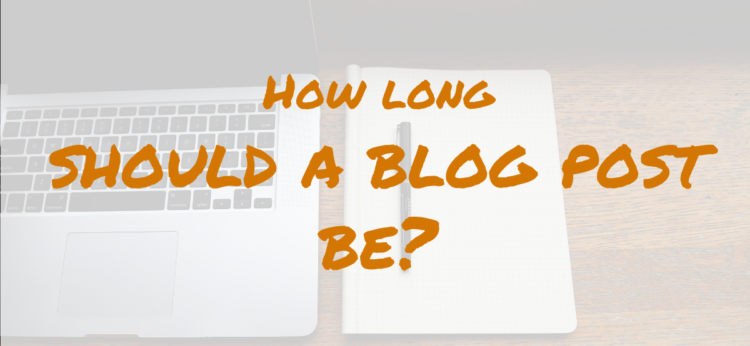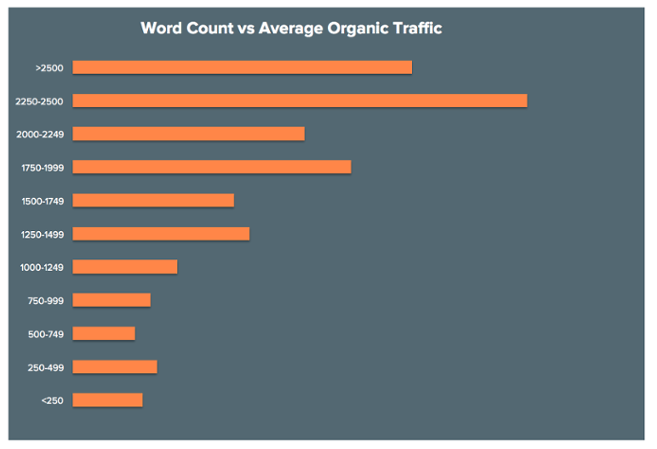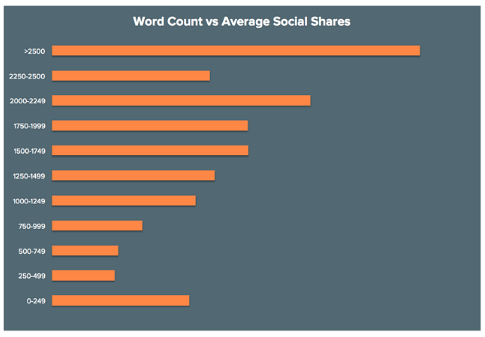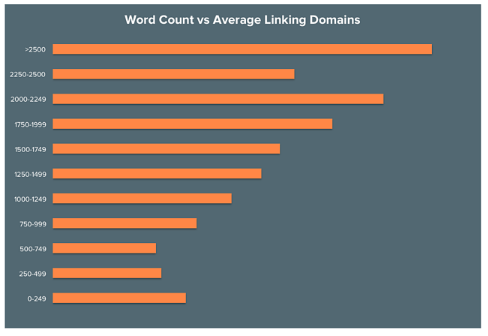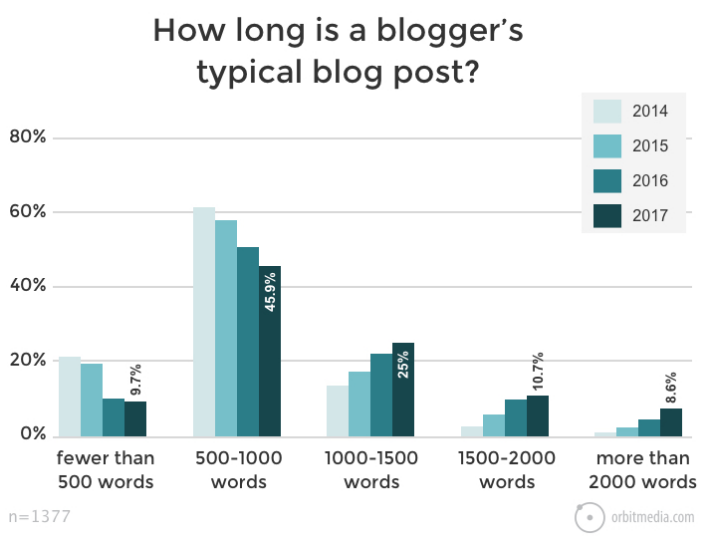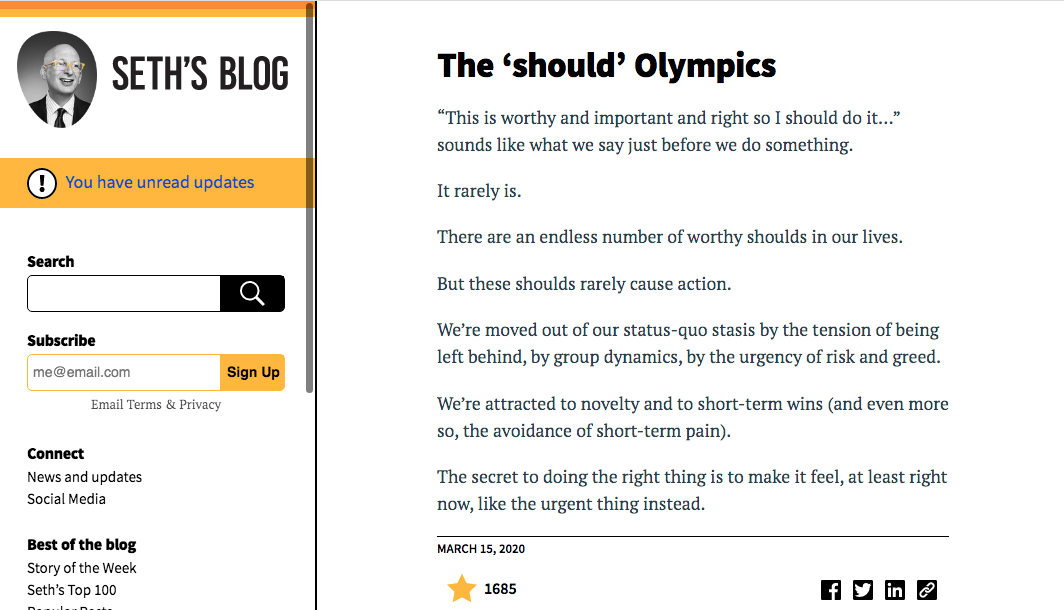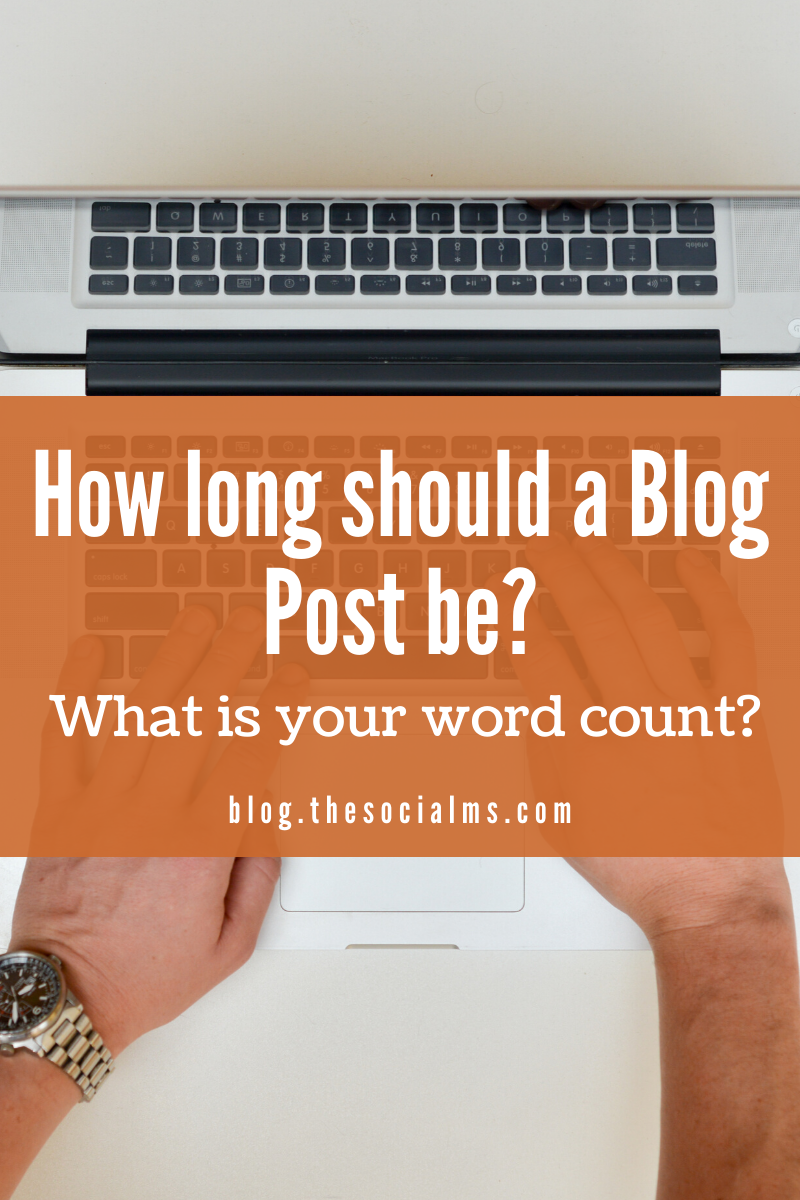How long are your blog posts? What is the ideal length of a blog post when it comes to blogging success? What would I suggest to a new blogger: What number of words is an absolute minimum for a perfect blog post and what blog post length should you aim for?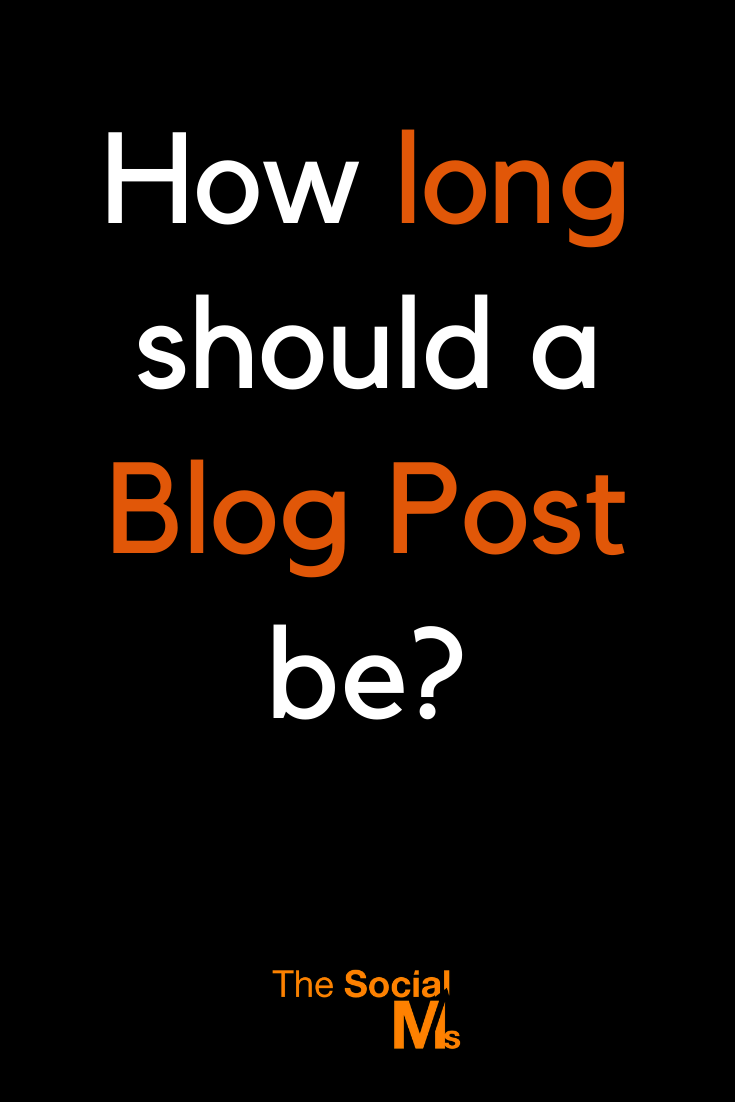
The answer could be: Whatever many words you need to say what you wanted to say, that’s a good length of content.
As always the answer is not that easy. It depends. On your goals, on your content, on your audience.
You still write for an audience and a purpose – never forget that. And results speak for themselves.
Before you read on - we have various resources that show you exactly how to use social networks to gain massive traffic and leads. For instance, check out the following:
FREE Step-by-Step Twitter Marketing GuideFREE Pinterest Marketing Ebook
Whatever your audience likes is a good start and if you see great results and reach the goals you set for your blogging – you are right on track.
But there is more to the question. And maybe your results could be even better – even if you already see good results.
In the end, only you can decide how long the perfect blog post for your purpose is. But you can make an educated decision – if you know what other people experience – and why.
Let us take a look at “literature” or rather at some studies some great bloggers have compiled. What is the general recommendation of blog post length, what numbers do studies recommend – and why?
How do your goals influence the length of your posts? Let’s start with a look at the best content lengths for various goals for blog post creation.
The ideal blog post length for SEO content
The SEO plugin YOAST for WordPress asks you to write a minimum of 300 words. Or rather Yoast’s SEO check will tell you that your content length is ok if it has more than 300 words.
Image Source: Yoast
However, that should not fool you.
Hey, before you read on - we have in various FREE in-depth guides on similar topics that you can download. For this post, check out:
FREE workbook: CREATE AWESOME BLOG POSTSFREE Beginner's Guide: START A BLOG
Every single SEO expert will tell you that usually longer content will perform better regarding SEO. Or at least that longer content will rank more easily than short content. And while a minimum of 300 words makes sense, it does in no way mean that blog posts of 300 plus a couple of words will be sufficient for good SEO content.
Hubspot recently took a close look at the most-read posts they have published in 2019.
They found that the ideal length of the posts varied whether they were comparing them for the organic search traffic they got or if they were looking for other goals like leads or social shares.
Image Source: Hubspot
The top 50 posts for SEO ranged from short (333 words) to long (5581 words.) On average, these posts had 2330 words but 16 of the posts had less than 1500 words – meaning that even shorter posts can still rank well and drive traffic if you get your SEO right or maybe found some keywords you can rank for that are not overly competitive.
The ideal blog post length for social shares
If your goal is to get your content to spread via social media, which means you are looking for social shares, the numbers look slightly different. Content with more than 2500 words received the most social shares. That means if your goal with your content is not SEO but to grow your social traffic, you should consider aiming for even longer content than for SEO.
(This image is from a slightly older study from Hubspot – but still holds true).
The ideal blog post length for backlinks
Another important goal for content creation is to earn backlinks.
Backlinks will help your SEO but they will also help you to get more traffic from other sources and get your brand in front of a larger audience. You can also brand yourself as the expert you are.
Again, Hubspot found that really long content with more than 2500 words performed the best when it comes to earning backlinks!
but how many more backlinks can you earn by writing longer posts? Is it worth the effort or is the difference so small that you don’t want to bother?
A study by MOZ and Buzzsumo that looked at 1 Mio articles examined how many backlinks a shorter or a longer post would be able to get. And the difference is significant. While posts with less than 1000 words got an average of 3.5 backlinks, long articles with over 3000 words got an average of 11 backlinks.
The ideal blog post length for lead generation
The study performed by Hubspot about the ideal length of blog posts in 2020 found that the best posts for lead generation had an average of 2569 words. The longest post that performed well for lead generation had an exceptional 8197 words. This corresponds with the perception that content for lead generation needs to display expertise and build authority.
Apart from the goals why you create content and how long your post should be to reach these goals, your industry also influences how long your content should be.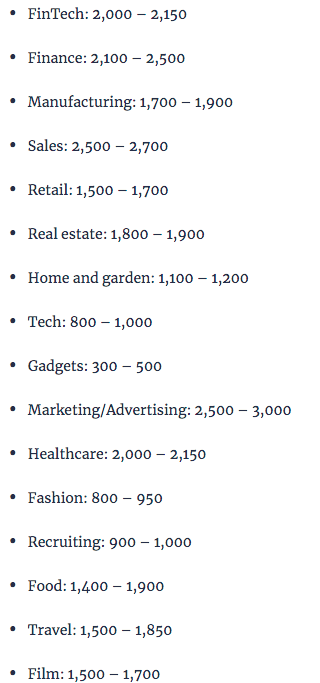
Because the ideal length of your blog posts also differs in the different industries. Neil Patel took a closer look at various industries and the ideal word count ranges for each industry.
This proves that in some industries you can get away with writing less than half the words than you need for good marketing content in some other industries like finance, sales, and marketing.
However, the ideal length of a post not only depends on your goals and your industry. Different types of content also ask for different post lengths.
Let us take a look at some content types:
The ideal length of list posts
According to the above-mentioned study by Hubspot, a good length for a list post is between 2300 and 2600 words.
List posts are still a popular format for blog posts for various reasons.
List posts still run well on social media – and list posts are fairly easy to create even for new bloggers without much writing experience. They come with a natural structure that makes them easy to read and easy to create.
As a rule of thumb, you can say: long lists with many list items run better than short lists. More items on your list naturally increase the number of words of your post.
The ideal length of How-to Posts
Hubspot discovered that the ideal length of a How-to post is slightly shorter than what SEO or lead generation seems generally to require. In their case, the best-performing How-to post ranged from 1,700 and 2,100 words.
The thing about How-to posts is that they simply have to explain how to do something. They don’t need more than that – but they should not contain any less. How-to posts are clearly written for an audience and if this audience is happy with the content they get the posts have achieved their goals.
Example: Imagine a food blog that publishes recipes. A recipe is in a way a how-to post; A post about how to cook something. A recipe needs a certain depth of explanation to be a good recipe. But any more text simply makes a recipe hard to read. More words will not turn the recipe into something better.
The ideal length of What-is posts
When writing this post, I considered not to mention What-is posts. This type of post is not very high on my radar when it comes to blogging – but maybe that is wrong.
Because What-is posts get away with much smaller word counts than any other of the mentioned post types.
What is a What-is post?
We actually have a couple of What-is posts on this blog. I wrote about “What is Content Curation” and Jonathan wrote about “What is SEO.”
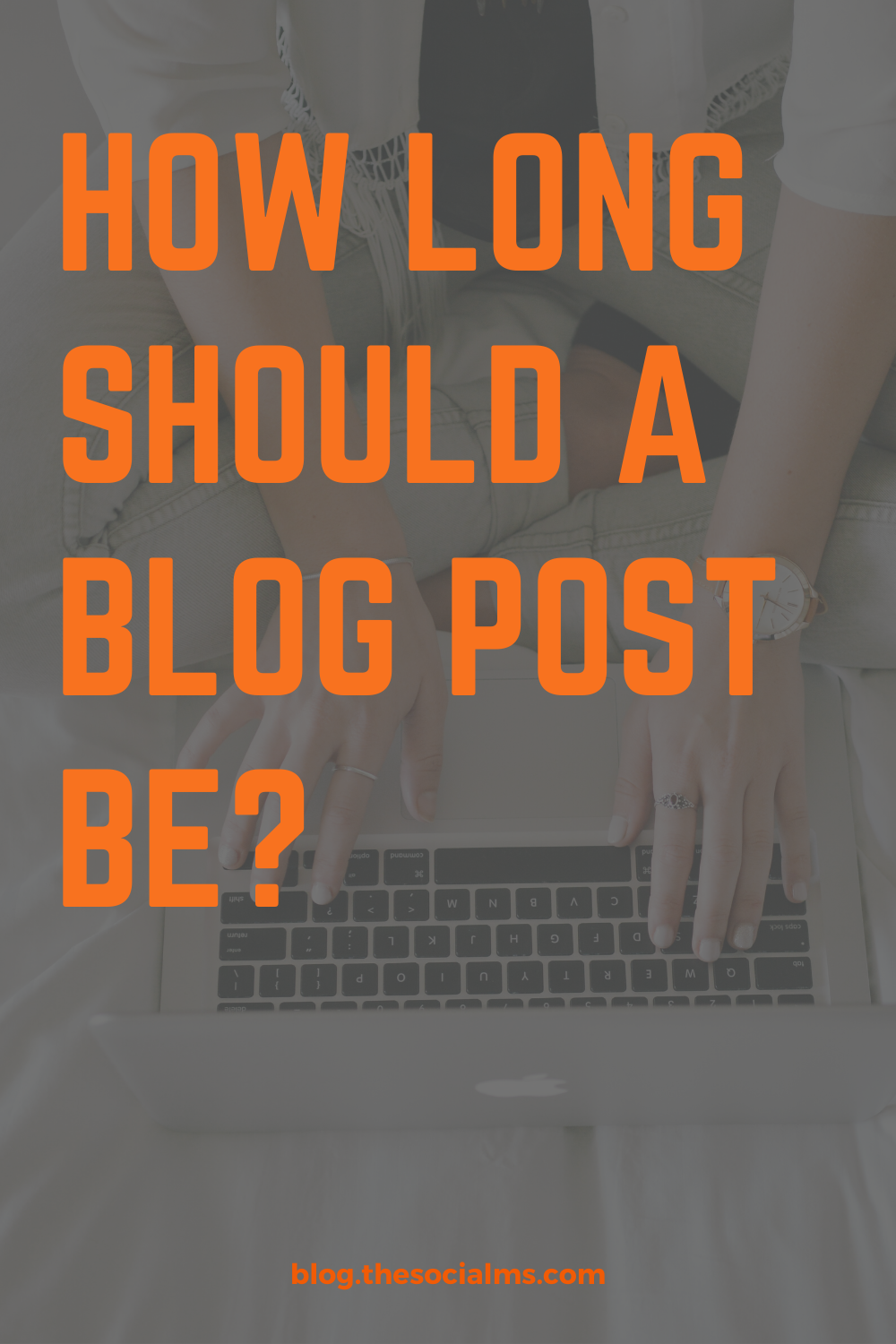 These posts have a purpose and they are finished when they explained the question they are asking. In the two examples on our blog that I mentioned, we added some “and how can you use it” to the post – so these posts were only half “What-is” posts.
These posts have a purpose and they are finished when they explained the question they are asking. In the two examples on our blog that I mentioned, we added some “and how can you use it” to the post – so these posts were only half “What-is” posts.
Hubspot found that the most successful “What-is” posts on Hubspot have an average of between 1300 and 1700 words.
But what is far more interesting for fans of short blog posts is that Hubspot also found that 30% of the most read What-is posts had less than 1000 words.
From all the types of posts and from all goals for posts that we looked at, this is rather on the short side!
If you want to go for shorter blog posts, maybe you should consider creating some “What-is” content.
What that means for bloggers
From the above you can conclude that the best blog content is often fairly long content.
In most cases, the ideal blog post length will be a lot longer than your average blog post has been so far. Most of you will probably not have written many posts of 2000 or more words.
In fact, most blog posts published in 2017 had less than 1000 words:
Image Source: Orbit Media
That poses a huge opportunity for you if you aim for longer and more in-depth blog posts.
Let’s assume that so far, you have on average written posts with a length of around 1000 words.
Now, taking all the above data into account, creating longer and more in-depth articles could tremendously help you to find more blogging success: Get more organic traffic, get more backlinks, get more social shares and earn more leads – all by simply increasing the word count for your average blog post.
If you invest an extra effort and create longer content than the average competitor, you have a huge chance of ranking better in Google search, getting more social shares, backlinks, and leads.
Consider your posting frequency
The problem with long-form content is that it takes more time to create, especially when you are new to the blogging game. The sheer time it takes to write 2000+ words can be really intimidating. Plus, it is much harder to write good long-form content.
Longer blog posts need more structure and visuals than short posts to make them a good read. This will influence the number of blog posts you can create – and you should consider this before you decide to only create long blog posts in the future.
If you are only able to create one piece of long-form content every couple of months you may run into other trouble:
- Google favors websites that are updated on a regular basis and have fresh content.
- If you want to post your content on your social media channels to get traffic you need a lot of different content. A handful of long pieces may not be enough and more pieces of shorter content could help here.
- Content quality could become an issue: Don’t add meaningless paragraphs just for the sake of adding a couple of extra words. Your audience will not thank you for bad content. Finding topics that are substantial enough to justify a long blog post may be harder than finding topics for short posts.
In addition, short posts could be more mobile-friendly. If you ever opened an epic long-form blog post on your mobile and saw those endless paragraphs of words that you scroll over for ages – you know what I am talking about.
Are all successful blogs creating long-form blog posts?
Hell, no.
A great example of a very successful blog that often publishes short posts is Seth Godin’s blog.
But there are other examples. For instance, a food blog that mainly publishes recipes will rarely aim for long posts of a couple of thousand words.
If you don’t believe me, you can take a look at Pinch of Yum – I checked some random recipe posts. They had between 300 and 600 words.
Is there a final answer to the question of how long a blog post should be?
Long blog posts tend to perform better on many levels. But short posts still have their own advantages and benefits.
You have to make an active decision about what you want to achieve with your blog content. You may be able to add value to your shorter posts by adding additional information in the form of images, videos or presentations instead of writing more words. For instance, recipe blogs often add videos to their posts.
To sum it up
Wow – that was a lot of numbers and data to take in. And all to answer such a simple question as “How long should a blog post be?”
Time to sum it up in some short words!
What you need to consider when you decide for the length of your post:
- Your goals. What do you want to achieve with the post? Posts that you create with SEO and traffic from Google search in mind should generally be rather longer.
- Your niche or industry: Some niches ask for longer posts than others.
- Your audience: Some audiences have other preferences than others
- Your posting schedule: How often do you publish a post? Can you keep up the schedule if you decide to create longer blog posts? If you write often, short posts seem more appropriate than when you write seldom.
Most of the time a longer blog post will bring in more success than a short post. But as always: It depends on your special case!
Do you want to create better blog posts? Do you want to learn about some types of blog posts you did not know? Do you need help to structure your posts in the best way?
Our Blog Post Templates help you with all that. Get 6 blog post templates for free. Download our blog post templates here!

